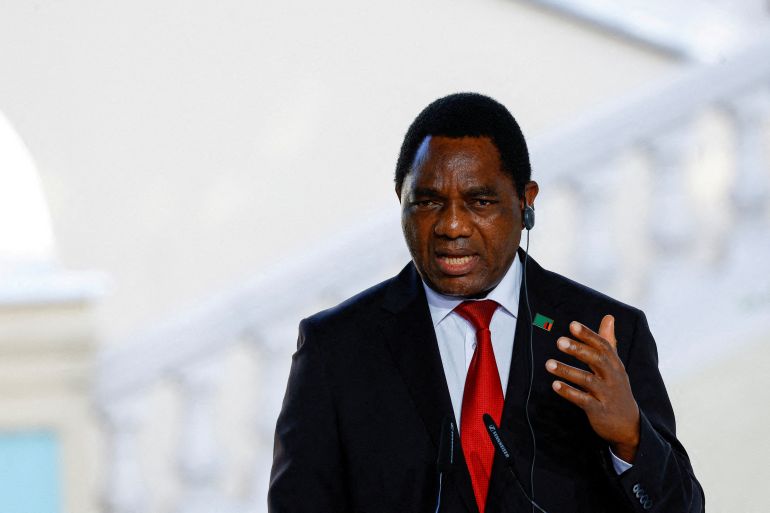Zambia declares national disaster after drought devastates agriculture
Drought crisis brought on by El Nino and climate change will affect more than a million households, President Hakainde Hichilema says.

Drought crisis brought on by El Nino and climate change will affect more than a million households, President Hakainde Hichilema says.

Zambia's President Hichilema says almost half of the nation's planted area has been 'destroyed'
[File: Valentyn Ogirenko/Reuters]
Published On 29 Feb 2024
Zambia has declared the drought the country is currently going through a national disaster, with President Hakainde Hichilema saying the lack of rain has devastated the agricultural sector, affecting more than one million families.
The southern African country has gone without rain for five weeks at a time when farmers need it the most, Hichilema said in a televised national address from the capital, Lusaka, on Thursday.
This compounded the effects of another dry spell and flooding that hit the nation last year, he added.
“The destruction caused by the prolonged drought spell is immense,” he said. The dry spell has already affected 84 of the country’s 116 districts.
Exacerbated by climate change and the El Nino weather phenomenon, the crisis threatens national food security, as well as water and energy supply, Hichilema said. Zambia is highly reliant on hydroelectric power.
“In view of these challenges … we hereby declare a prolonged drought as a national disaster,” the president said.
The measure allows for more resources to address the crisis, with the drought expected to last well into March.
Due to influence of El Nino on the 2023-2024 rainy season, Zambia has lost one million hectares (2.5 million acres) from 2.2 million planted crops.
Almost half of the nation’s “planted area” has been “destroyed”, Hichilema said.
He said humanitarian aid would be made available to ensure people do not go hungry, and he urged cooperating partners to provide relief beyond grain.
The president said Zambia had also drawn up plans to import and ration electricity to keep the economy and industries running, especially the heavily power-dependent mines.
Zambia is Africa’s second-largest copper producer.
Hichilema said the energy sector this year was expected to have a deficit close to 450 megawatts or even above 500 megawatts.
The 2024 national budget will be re-aligned so that more resources could be channelled towards addressing the impact of the drought, he added.
“The current projections are that over a million farming households will be affected,” he said.
Zambia defaulted three years ago and is trying to rework its debt under the G20 Common Framework, a programme designed to ensure swift and smooth debt overhauls for low-income nations.
Hichilema said Zambia’s situation was dire and called on its official and private creditors to quickly conclude its debt restructuring process.
“If this process does not close, it’s not just an indictment on Zambia but the global system,” he said.
The naturally occurring El Nino climate pattern, which emerged in mid-2023, usually increases global temperatures for one year afterwards. It is currently fuelling fires and record heat across the world.
No comments:
Post a Comment